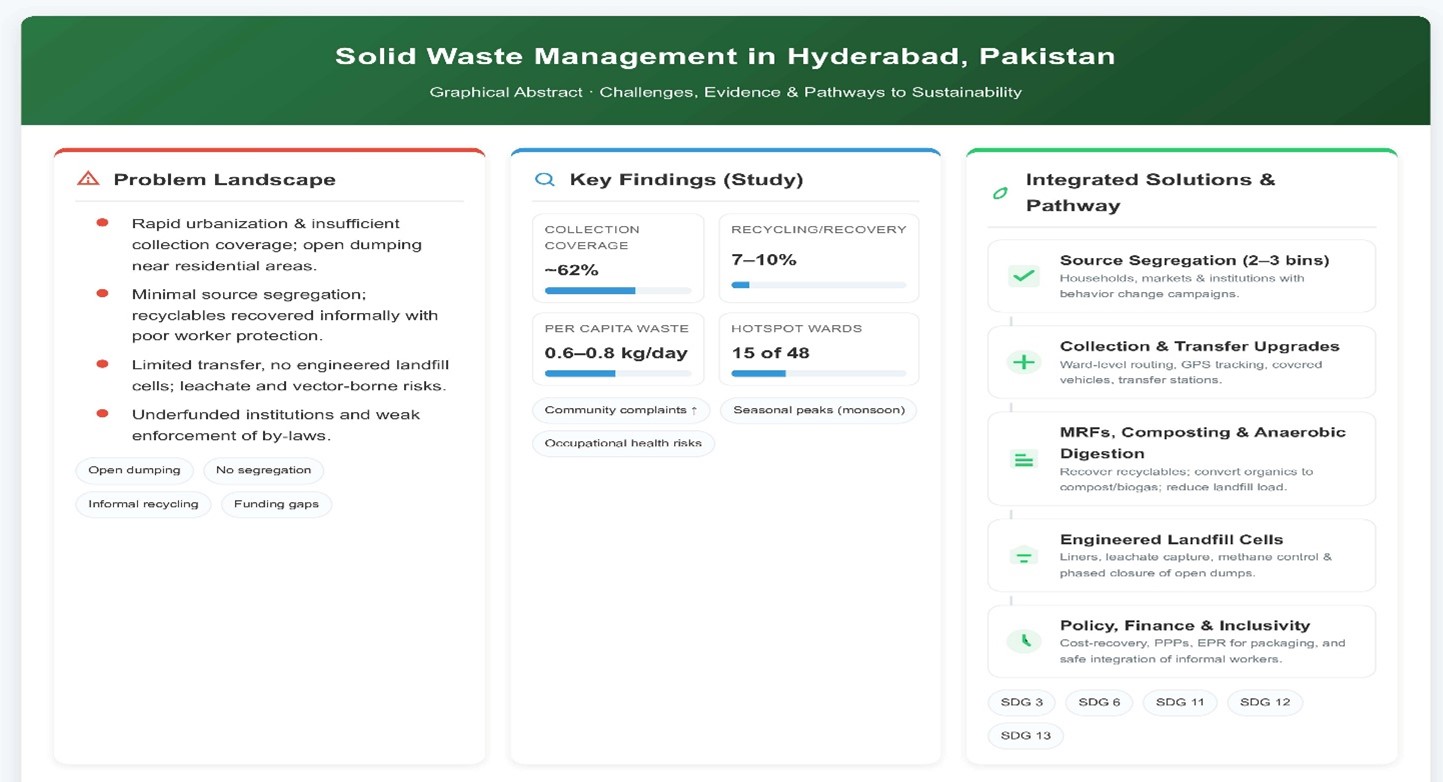
APA Style
Abdul Rasool Khoso, Shahnaz Bhutto, Wang Suyuhan. (2025). Challenges and Opportunities in Solid Waste Management for Sustainability in District Hyderabad, Pakistan. Sustainable Processes Connect, 1 (Article ID: 0016). https://doi.org/Registering DOIMLA Style
Abdul Rasool Khoso, Shahnaz Bhutto, Wang Suyuhan. "Challenges and Opportunities in Solid Waste Management for Sustainability in District Hyderabad, Pakistan". Sustainable Processes Connect, vol. 1, 2025, Article ID: 0016, https://doi.org/Registering DOI.Chicago Style
Abdul Rasool Khoso, Shahnaz Bhutto, Wang Suyuhan. 2025. "Challenges and Opportunities in Solid Waste Management for Sustainability in District Hyderabad, Pakistan." Sustainable Processes Connect 1 (2025): 0016. https://doi.org/Registering DOI.
 ACCESS
Research Article
ACCESS
Research Article
Volume 1, Article ID: 2025.0016

Abdul Rasool Khoso
lx20220614007@hhu.edu.cn

Shahnaz Bhutto
220214140015@hhu.edu.cn

Wang Suyuhan
lx20230614104@hhu.edu.cn
Department of Sociology, School of Public Administration, Hohai University, Nanjing, China
* Author to whom correspondence should be addressed
Received: 27 Jun 2025 Accepted: 26 Sep 2025 Available Online: 30 Sep 2025
Hyderabad, one of Pakistan’s rapidly urbanizing districts, faces a mounting solid waste management (SWM) crisis, with municipal systems collecting barely half of the 1,500–2,000 metric tons of daily waste. This study investigates the challenges and opportunities of SWM in the city through a mixed-methods design, combining household surveys (n = 385), statistical modeling, and comparative analysis of global best practices. Logistic regression results identify education and awareness as the strongest predictors of waste segregation: graduates are 2.86 times more likely to participate, and residents aware of recycling programs are 3.74 times more likely. Conversely, households with incomes below PKR 20,000 show disproportionately high reliance on open dumping (38.1%), revealing deep structural inequities. Cross-tabulation highlights the uneven distribution of municipal services, while waste composition analysis shows that organic (43.3%) and plastic (22.8%) discards dominate household waste streams. Despite 73.5% of respondents recognizing health risks, only 23.9% express willingness to pay for improved services, underscoring a governance and trust deficit.
Drawing on successful international models—such as Sweden’s integrated recycling-energy systems, South Korea’s volume-based fees, and Brazil’s integration of informal waste pickers—the study proposes context-specific solutions for Hyderabad, including decentralized composting, incentivized waste reduction, and formalization of the informal recycling sector. The findings make a dual contribution: first, by offering one of the few empirical, regression-based assessments of SWM behavior in Pakistan; and second, by framing Hyderabad’s challenges within a comparative global perspective that yields actionable, locally adaptable strategies. The study underscores the critical role of education, equity, and governance reforms in advancing sustainable waste management. These insights hold relevance not only for Hyderabad but also for other mid-sized cities in developing regions struggling with parallel waste management crises.

Disclaimer : This is not the final version of the article. Changes may occur when the manuscript is published in its final format.
We use cookies to improve your experience on our site. By continuing to use our site, you accept our use of cookies. Learn more